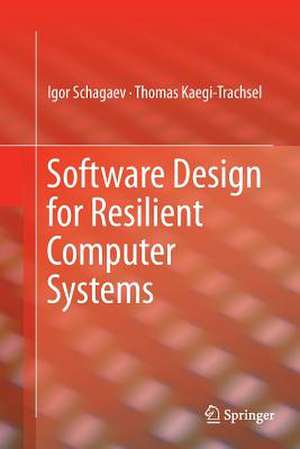Software Design for Resilient Computer Systems
Autor Igor Schagaev, Kaegi Thomasen Limba Engleză Paperback – 16 mar 2019
Preț: 723.56 lei
Preț vechi: 882.39 lei
-18% Nou
Puncte Express: 1085
Preț estimativ în valută:
138.49€ • 144.03$ • 116.05£
138.49€ • 144.03$ • 116.05£
Carte tipărită la comandă
Livrare economică 14-28 martie
Preluare comenzi: 021 569.72.76
Specificații
ISBN-13: 9783319805795
ISBN-10: 3319805797
Pagini: 214
Ilustrații: XIV, 214 p. 70 illus., 51 illus. in color.
Dimensiuni: 155 x 235 mm
Greutate: 0.33 kg
Ediția:Softcover reprint of the original 1st ed. 2016
Editura: Springer International Publishing
Colecția Springer
Locul publicării:Cham, Switzerland
ISBN-10: 3319805797
Pagini: 214
Ilustrații: XIV, 214 p. 70 illus., 51 illus. in color.
Dimensiuni: 155 x 235 mm
Greutate: 0.33 kg
Ediția:Softcover reprint of the original 1st ed. 2016
Editura: Springer International Publishing
Colecția Springer
Locul publicării:Cham, Switzerland
Cuprins
Introduction.- HardwareFaults.- Fault Tolerance: Theory and Concepts.- Generalized Algorithm ofFault Tolerance (GAFT).- GAFT Generalization: APrinciple and Model of Active System Safety.- System Software Support for Hardware Deficiency: Function andFeatures.- Testing andChecking.- Recovery Preparation.- Recovery: Searching and Monitoringof Correct Software States.- Recovery Algorithms:An Analysis.- Programming Language for Safety Critical Systems.- Proposed Runtime System Structure.- Proposed Runtime System vs. Existing Approaches.- Hardware:The ERRIC Architecture.- Architecture Comparison and Evaluation.- ERRIC Reliability.
Notă biografică
Dr. Igor Schagaev is a Professor and Head of Laboratory of Applied Computer Science and Technology (LACOST) Faculty of Life Science and Computing and London Metropolitan University. He is a Fellow of the Institute of Analyst and Programmers (UK) and has previously work as an Electromechanical Engineer at the Smolensk aviation factory, USSR, a Senior Programmer and Design Engineer at the Institute of Advanced Computations, Central Bureau, Smolensk Branch, and a Senior Design Engineer and System Programmer for Avionics, and was Director of ATLAB Ltd Bristol. He has published 5 books, over 60 papers, and has been honored with several industry awards, achievements, and grants.
Dr. Thomas Kaegi-Trachsel received his PhD in 2012 in ETH Zurich in the area of system software for embedded systems (under supervision of Prof Schagaev). He is currently a Senior Researcher at IT-ACS Ltd.
Dr. Thomas Kaegi-Trachsel received his PhD in 2012 in ETH Zurich in the area of system software for embedded systems (under supervision of Prof Schagaev). He is currently a Senior Researcher at IT-ACS Ltd.
Textul de pe ultima copertă
This book addresses thequestion of how system software should be designed to account for faults, andwhich fault tolerance features it should provide for highest reliability. Theauthors first show how the system software interacts with the hardware to toleratefaults. They analyze and further develop the theory of fault tolerance tounderstand the different ways to increase the reliability of a system, withspecial attention on the role of system software in this process. They furtherdevelop the general algorithm of fault tolerance (GAFT) with its three mainprocesses: hardware checking, preparation for recovery, and the recoveryprocedure. For each of the three processes, they analyze the requirements andproperties theoretically and give possible implementation scenarios and systemsoftware support required. Based on the theoretical results, the authors derivean Oberon-based programming language with direct support of the three processesof GAFT. In the last part of thisbook, they introduce a simulator, usingit as a proof of concept implementation of a novel fault tolerant processorarchitecture (ERRIC) and its newly developed runtime system feature-wise andperformance-wise. The content applies to industries such as military, aviation,intensive health care, industrial control, space exploration, etc.
· Outlinespotential critical faults in the modern computer systems and what is requiredto change them
· Explainshow to design and re-design system software for the next generation ofcomputers for wider application domains and greater efficiency and reliability
· Presentshow implemented system software support makes maintenance of computer systemsmuch easier, while reliability and performance increases
· Outlinespotential critical faults in the modern computer systems and what is requiredto change them
· Explainshow to design and re-design system software for the next generation ofcomputers for wider application domains and greater efficiency and reliability
· Presentshow implemented system software support makes maintenance of computer systemsmuch easier, while reliability and performance increases
Caracteristici
Outlines potential critical faults in the modern computer systems and what is required to change them Explains how to design and re-design system software for the next generation of computers for wider application domains and greater efficiency and reliability Presents how implemented system software support makes maintenance of computer systems much easier, while reliability and performance increases Includes supplementary material: sn.pub/extras
